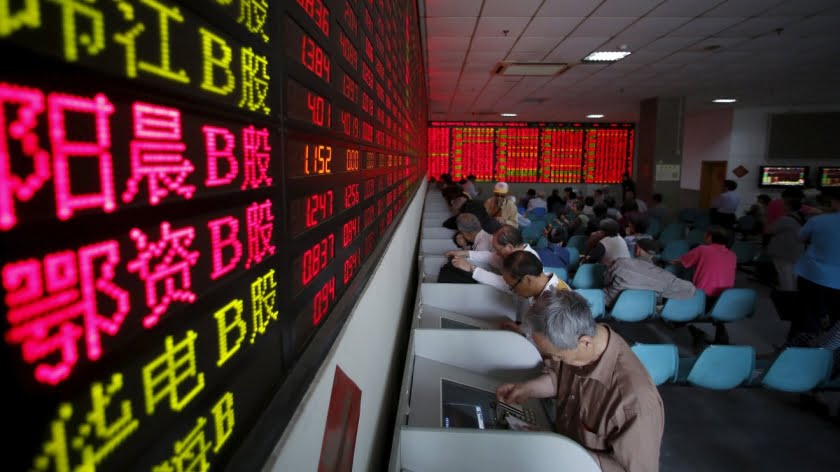Trade War with China: US Will Make Sure It Causes Major Ruckus Before Losing the Fight
There are suggestions that the US and China may now sign a trade agreement in May. However, it seems unlikely that this will be the great victory over China that Trump promised, as recent events indicate.
Just a month ago, the European Union (EU) appeared to have jumped aboard the anti-Chinese bandwagon of the Trump administration, when it labelled Beijing a “systemic rival” over what it viewed as unfair trade practices. It also stated that it was rolling out its own strategy to counter China’s influence. While the EU is likely to want to pushback against China and counter it wherever necessary, recent developments do indicate that there is very little the EU and the US can do to scale back China’s influence without resorting to outright war, and are looking to cooperate and engage with China instead.
One such example is Italy’s recent decision to join China’s so-called Silk Road project by signing a memorandum of understanding. Italy is a G7 member, and the first G7 nation to endorse China’s Belt and Road ambitions. At the same time, Chinese and Italian firms signed 10 deals worth up to approximately $5.6 billion in the energy, steel and gas pipeline sectors. Fears from the other major players about the strengthening relationship between Italy and China were shrugged off by the Italian side, who said that opposition to its move was motivated by “jealousy.”
Another notable example is the newly signed EU-China joint statement which agreed that the two sides would “establish a political mechanism to continuously monitor the progress in the negotiations and to report to leaders by the end of the year on the progress made.” The joint statement is the next step on the pathway to the creation of an EU-China Comprehensive Investment Agreement by 2020 which is aimed at improving market access and eliminating practices that discriminate against foreign investors. Just this week, China’s ambassador to the EU, Zhang Ming, said that the EU should avoid using discriminatory practices, already concerned about the screening process currently in place.
Despite the EU’s original characterization of China as a “systemic rival,” the EU and China have essentially pledged to strengthen their trade relationship and work more closely towards opening up China’s economy to foreign investors. European Council President Donald Tusk called the joint statement a “breakthrough.” China, for its part, has issued encouraging statements of its own to keep the EU on side, stating that it would “respect European standards” and not seek to divide the EU bloc.
In reality, China knows that the Eastern European states referred to above are integral to the Silk Road project, without the inclusion of which it could never really hope to bring its ambitious initiative to fruition.
The so-called Beijing-led “16+1”, which involves 16 post-socialist states including eleven other EU members and five countries which are currently undergoing accession to the EU, is another interesting development to keep an eye on as the years go by. These smaller states are giving the EU greater say over ongoing deals with China in order to mitigate the concerns that major European powers have about Beijing’s expanding influence. According to some sources in this year’s negotiations on the 16+1 joint statement, each completed draft was seen by EU officials in Brussels prior to signing.
Even major players such as France have struggled to resist the opportunities that China presents. At the end of last month, Chinese President Xi Jinping visited France and met with Emmanuel Macron, signing several deals worth billions of euros. Prior to the visit, Xi wrote an op-ed in the conservative outlet Le Figaro compelling French companies to join its Silk Road project.
Instead, much of the major opposition to the gravitational pull of China’s Silk Road project comes from Germany.
German Foreign Minister Heiko Maas said recently: “In a world with giants like China, Russia or our partners in the United States, we can only survive if we are united as the EU… if some countries believe they can do clever business with the Chinese, then they will be surprised when they wake up and find themselves dependent.”
Of course, the real perpetrator of the anti-Chinese trade perspective remains the Trump administration. But even its position on this appears to be slowly but surely falling apart. Just recently, US negotiators allegedly decided not to fixate on demands for China to curb industrial subsidies as a condition for its trade deal due to strong opposition from Beijing.
The reason China apparently pushed back is because industrial subsidies are connected directly to the Chinese government’s industrial policy. As Reuters explains, Beijing grants subsidies and tax breaks to state-owned firms and to other sectors that the government views as strategically important for Chinese development.
Here’s the thing though: if Washington stuck to its position on this issue, it would hit Beijing exactly where it hurts. So, if it isn’t prepared to go through with it and truly challenge the Chinese government in its most vulnerable areas, then what is the point? Why act tough on China and then, when it comes to crunchtime, do the complete opposite?
According to Reuters’ sources, it all comes down to Washington’s desire to secure a deal within the upcoming months. Therefore, US negotiators are focussing more on areas which are considered more achievable.
At the end of the day, the Trump administration is more interested in creating a new deal that it can flaunt as its own, but it won’t actually be a document that has any teeth or demonstrate any significant victory over China. As Fortune explains, “it’s tough to see what the Chinese side will agree to beyond promises to buy more US goods, given that it denies allegations of misbehaviour that include forcing foreign companies to hand over their technology.”
One source also told Reuters: “Whatever deal we get, it’s going to be better than what we’ve had, and it’s not going to be sufficient for some people. But that’s politics.”
Right now, indications seem to suggest that the US and China will have a deal signed by late May. After approximately nine months of a trade war which has essentially gotten no one anywhere and has in some cases hit US companies harder than Washington would like to admit, perhaps the whole notion of a trade war with China being a viable pathway forward will eventually disappear. The Interim Economic Outlook published in March by the Organization of Economic Cooperation and Development (OECD) showed that the global economy had taken a pretty hard hit due to Trump’s trade war; and seems unlikely to recover quickly even if a trade agreement is reached in the not-so-distant future.
Tying it all together, the OECD report warned that new restrictions in specific trade-sensitive sectors such as cars and car parts “would hit Europe particularly, where motor vehicle exports represent around one-tenth of total EU merchandise exports to the United States and there are significant supply-chain linkages that spread the impact widely across countries and sectors.”
President and CEO of the Atlantic Council Frederick Kempe wrote an op-ed for CNBC in which he essentially asks the US and the EU to come together to influence China’s ascent on the global stage. According to Kempe, China’s rise to power requires either an engagement or a containment strategy, yet the EU and the US have offered neither, which has produced the worst of all worlds.
Op-eds like Kempe’s start to make a lot more sense when viewed in the light of recent developments which show that the issue is not that the US and the EU have not deployed a containment strategy; rather, the blunt truth is that such a containment strategy was doomed to fail from the outset.
Whether the trade war falls flat on its face or escalates into something far more sinister, the fight between the US and China is much larger than the maintenance of Donald Trump’s ego. As Fortune put it, the “fight is also about who gets to set the rules for the global economy of the future.”
You can bet therefore, that Washington will do everything in its power to ensure that this is not a fight it loses without causing a major ruckus first.
By Darius Shahtahmasebi
Source: RT







